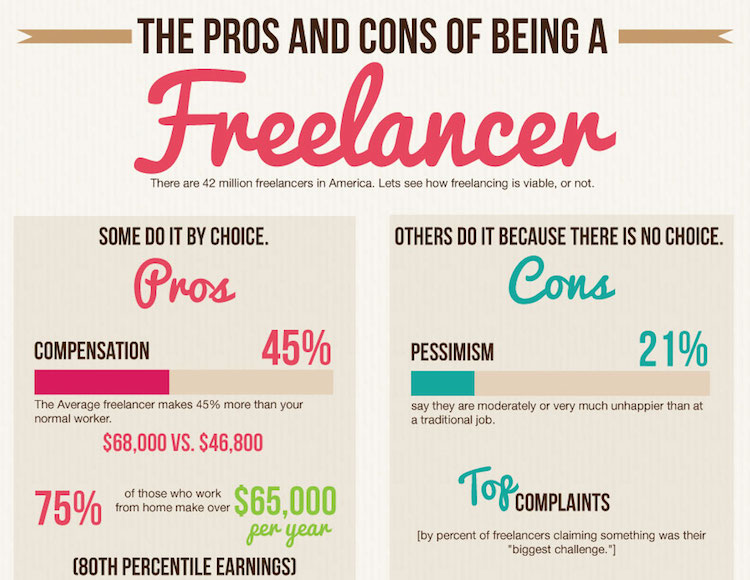
(Photo: Bogdan Sonjachnyj / Shutterstock)
With freelancers making up 35% of the American workforce, more and more people are taking the leap to becoming their own bosses. The thought of making your own hours and driving your own work/life balance is increasingly attractive, no matter the industry.
But what does it take to go freelance? And why is it important to be prepared? While freelancing may seem like the path to a higher income and more freedom, it’s worth carefully considering all aspects before taking the plunge in order to set yourself up for the greatest possible success.
To that end, we’ve pulled together an initial list of considerations to make when setting up life as a freelancer.
Learn to avoid these common mistakes, and you’ll soon be on a path to join the 55 million Americans who are freelancing.
Don’t make the leap from full-time to freelancing before you’re ready.
If you are already working a full-time job, there’s no need to think that you must quickly quit before you are ready. In fact, many people transition slowly into freelancing, building their businesses up while holding on to their day job. While it may cause you to work longer hours in the short term, it can also help you test the waters of the market and ease the financial burden until you feel you are ready. Just make sure you go about it the right way.
The Freelance Podcast is a great resource if you are considering leaving your full-time job, as it features helpful advice from starting your business from people who have made the transition.
Don’t find out that you hate working alone.
One aspect that people often underestimate when becoming a freelancer is the change in social dynamic. If you are coming from a bustling office full of colleagues and moving to working from home, it could be a difficult adjustment. Carefully consider if you are ok with mostly working alone and plan accordingly.
Breaking up your day with a social activity, working from a local cafe or co-working space can help combat the blue if you are a social butterfly.

Click for full infographic. (via Graphic Design Degree Hub)
Don’t try to do everything.
In other words, find your niche and stick to it. It’s not enough to simply say you are a designer or photographer. People will want to know what makes you unique or how you might solve a problem they need fixed. Being as specific as possible, and being able to market yourself accordingly, is a key to success. Then, once you’ve built up a reputation in your chosen field, you can start branching into other areas. Aren’t sure how to find your niche? Read our guide on how to discover your artistic niche.
Don’t give away your time.
Moving from a 9 to 5 structure can be both liberating and terrifying. You may find yourself working at all hours and unsure of what projects to green light or reject. Some of this is normal. When you are your own boss, there can be less downtime, especially in the beginning. Clients will expect you to cater to their schedules and make yourself available accordingly. But that doesn’t mean you need to say yes to everything or undersell your value. Pricing and time tracking are essential for ensuring you are spending your time wisely.
Time tracking tools like Toggl or Chrometa will not only make it easier to invoice clients, but can also help you analyze and optimize how you are spending your workday. And if you aren’t sure what to charge, BeeWits is a great hourly rate calculator that takes into consideration important factors like overhead costs and how you’d like to improve your yearly salary.
Don’t underestimate the importance of marketing.
Once you know your niche and have figured out your rates, you’ll start working with clients. Of course, some may come from pre-existing business relationships, which are always helpful to leverage, but marketing will quickly become one of the most important aspects of your work life. You can be the most talented person in your field, but without proper marketing, no one will know.
This starts with building a fantastic website to show off your portfolio or making sure you are on the proper platforms to sell your work. And don’t underestimate the importance of social media marketing and new technology. Staying on top of the latest trends will ensure you are ahead of the curve. Learn how to market your creativity through our list of tips and tricks.
Want to make sure you have what it takes to go it on your own? Check out these online courses to make sure you avoid common mistakes when starting a freelance business.
Freelancing 101: Turning your Side Hustle into Cash
An Insightful Guide to Becoming a Freelancer
Freelancing for Creatives: Kickstart Your Independence
Going Freelance: Building and Branding Your Own Success
How to Communicate with Clients: Building Relationships that Last
Driving Traffic to Your Online Business
This post may contain affiliate links. Please read our disclosure for more info.
Related Articles:
How to Create a Store on Shopify to Sell Your Creative Products
How to Create a Blog on WordPress in Three Easy Steps
13 Ways for Artists to Sell Their Creative Work Online
20+ Best TED Talks to Inspire Creativity
13 of the Best Creative Podcasts Offering Great Advice and Endless Inspiration
